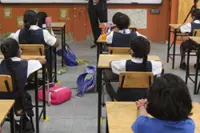Reform needed: (From left) Malaysian Indian Community Development and Transformation Organisation president R. Ravichandar, Arun, M. Vetrivelan, Tamil Language Teachers Association of Secondary Schools Selangor chairman S. Sundaramurthi, M. Kumaran and Malaysian Tamil School Education Development and Welfare Association assistant treasurer Mahes Raam during the press conference. — Low Boon Tat / The Star
THE future of Tamil schools in Malaysia is at risk due to declining enrolment and reduced funding, non-governmental organisations (NGOs) warn.
Despite an overall increase in the Education Ministry’s budget throughout the years, the financial support for Tamil schools has been “shrinking”, making it difficult to maintain infrastructure and cover administrative expenses, Malaysian Tamil School Alumni Association (Pertama) deputy president M. Kumaran told a press conference in Kuala Lumpur on March 5.
Six NGO representatives were present at the session to discuss concerns related to Tamil schools and the education of Indian students in Malaysia.
“In 2020, Tamil schools received RM50mil in annual funding to cover administrative costs.
“But since 2021, there have not been any specific allocations for Sekolah Jenis Kebangsaan Tamil (SJKT) and Sekolah Jenis Kebangsaan Cina (SJKC) schools,” he said, adding that Tamil schools only received RM25.5mil when Budget 2025 was tabled last year.
This, he said, was despite a higher RM58.7bil allocation for the Education Ministry as compared to RM55.2bil under Budget 2024.
Kumaran also raised concerns about the lack of preschool facilities in Tamil schools.
“As of December last year, only 275 Tamil schools had kindergartens.
“Some Tamil schools that previously had kindergartens are now struggling to get the necessary approvals to reopen after operations were stopped a few years ago,” he said, stressing the need for additional funds and a more transparent allocation distribution system for Tamil schools.
Meanwhile, Centre for Vernacular School Excellence director Arun Dorasamy called on the Education Ministry to develop a structured relocation plan for the long-term sustainability of Tamil schools nationwide.
He said a detailed plan is crucial to help increase student enrolment in Tamil schools.
Currently, he said, 67% of Tamil schools are in rural areas and these must be relocated to highly populated zones.
“Urban Indian communities lack access to Tamil schools, while rural Tamil schools struggle with low student enrolment due to a declining Indian population in these areas.
“We have continuously pushed for a relocation plan under the 12th Malaysia Plan (12MP) and the national budget.
“Without a structured relocation plan, Tamil schools will eventually cease to exist,” he said.
Citing statistics from the Education Ministry, he said student enrolment in Tamil schools across Malaysia has been on the decline.
The number of students, excluding preschoolers, has dropped from 77,828 last year to 72,080 as of February this year, he said.
The number of schools with 10 or fewer students, however, has increased significantly over the past year.
Currently, there are 37 schools with 10 or fewer students out of a total of 528 schools, compared to 26 schools in May last year, he said.
“For schools with 30 or fewer students, the number has risen from 132 schools to 155 schools in the same period, marking an increase of 17.4%.
“Last year, concerns were raised about schools with fewer than 10 students, which needed immediate attention, including potential relocation,” he said, adding that now, with 37 schools in this category, the need for intervention is dire.
Termite infestation, said Arun, is another reason why some Tamil schools urgently need to be relocated.
To ensure the successful relocation of Tamil schools, support, collective effort and commitment from the government, community leaders and NGOs are crucial, he said.
Malaysian Tamil School Education Development and Welfare Association president M. Vetrivelan urged the government to allocate 0.2% of the national education budget for the repair, maintenance and relocation of Tamil schools.
“Equal access to quality education is a fundamental right.
“A just education system must serve all communities equitably,” he said.
On Feb 24, Education Minister Fadhlina Sidek gave an assurance that no Tamil vernacular school would be closed under the Madani administration.
The government would take care of the SJKT, she said during her winding-up speech in Dewan Rakyat.





